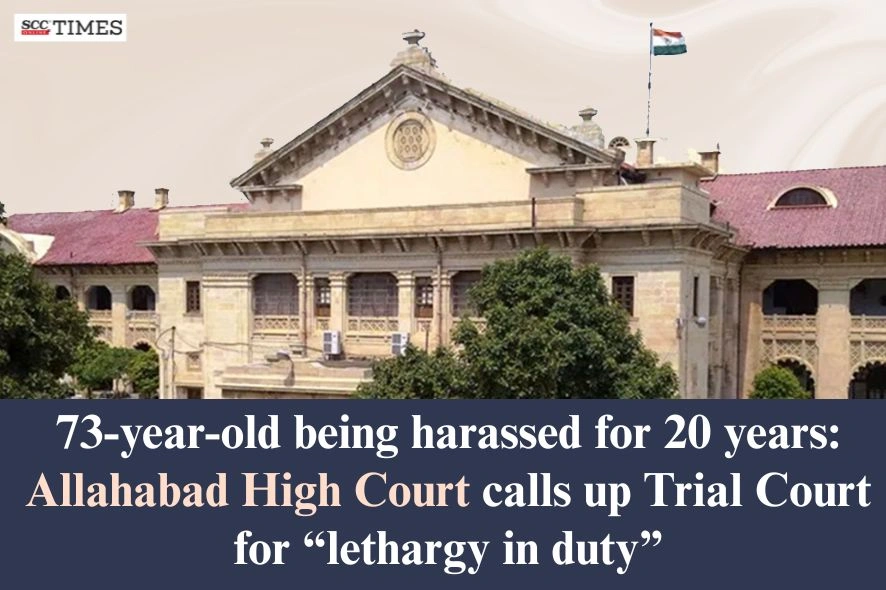Allahabad High Court: In an application filed by the applicant-accused, 73-year-old person, to quash the chargesheet in case under Section 129 of the Representation of People Act 1951 (‘Representation Act’), a Single Judge Bench of Vivek Kumar Singh. J., held that the Trial Court was lethargic in functioning its duty as the accused was not causing any delay, rather it was the prosecution, who repeatedly sought adjournments, and the Trial Court was very liberal in granting the same.
The Court stated that the accused had been harassed for the last 20 years and directed the Trial Court to conclude the trial within one month.
Background
The accused contended that a false first information report (‘FIR’) was lodged against him in 2005 and after investigation, a charge sheet was submitted in this case. Thereafter, the Trial Court took cognizance of offence, and charges were framed in the aforesaid trial after 7 years. He further submitted that not a single prosecution witness came to the Court to give testimony, and he was regularly appearing before the Trial Court for the last 13 years.
He further argued that non-bailable warrants were issued against the witnesses, but no one turned up in the Trial Court to give testimony, yet unnecessary adjournments even on oral prayer were granted.
Analysis and Decision
The Court noted that the accused was being prosecuted in this case under Section 129 of the Representation Act wherein maximum punishment is up to six months or with fine or both, but he was being harassed for the last 20 years even though he regularly appeared for the last 13 years. Further, it was almost after 11 years that the Trial Court issued Non Bailable Warrants to the persecution witnesses in 2023 but till date, not a single witness appeared to give evidence.
The Court stated that “This is a very serious matter, where a senior citizen, aged about 73 years, is being victimized by the trial court and prima facie, from perusal of records, it appears that the trial court is lethargic in functioning its duty and doing nothing except granting unnecessary adjournments, sought on behalf of the prosecution.” The Court further stated that the Trial Court completely ignored the directions issued by this Court as well as by the Apex Court, wherein it was directed that old cases should be disposed of at the earliest.
The Court emphasized that the right of speedy trial is a fundamental right of the accused, and it even includes the period of investigation. Referring to Hussainara Khatoon v. State of Bihar, (1980) 1 SCC 81 and Pankaj Kumar v. State of Maharashtra, 2008 (16) SCC 117, the Court stated that “the right of speedy trial does not confine only to the court proceedings but if there is long delay in concluding the investigation then also fundamental right of speedy trial of accused is violated.”
Therefore, the Court held that if the right of speedy trial of an accused gets violated, then proceedings can be quashed, if the delay is not attributable to the accused. The Court observed that in the case at hand, the accused was not causing any delay rather it was the prosecution, who was seeking adjournments and the Trial Court was very liberal in granting adjournments and did not close prosecution evidence. The act of Trial Court was not at all appreciable.
The Court examined the order sheet and stated that the Presiding Officer of the Trial Court had been postponing the old cases in a casual and routine manner, fixing long dates, and giving the impression that there was something wrong somewhere, however, there was a lack of sense of responsibility and seriousness on the part of the Presiding Officer in taking up the old cases for disposal.
The Court stated that like all the other organs of the state, the Judiciary held equal accountability towards the people, thus, the presiding officer of the Trial Court should realize his accountability to the common man. The old cases should be attended on a priority basis, unmindful of the various limitations and difficulties. The Court further stated that “Several directions and circulars were issued by this Court for quick disposal of cases, but it appears that the same is not being followed by the Presiding Officer of the Trial Court.”
The Court opined that the Trial Court was lethargic in functioning its duty. Thus, the Court directed the Trial Court to conclude the trial within one month and if the prosecution failed to produce any evidence on the next date fixed, the opportunity to produce prosecution evidence would be closed. The Court further directed the Trial Court to communicate after one month as to whether the trial of the aforesaid case could be concluded or not, failing which, there would be no option except to proceed against the erring Judicial Officer for not complying with various directions issued by this Court from time to time.
[Shrish Kumar Malviya v. State of UP, 2025 SCC OnLine All 8062, decided on 20-11-2025]
Advocates who appeared in this case:
For the Applicant: Ritik Kumar Mishra
For the Respondent: Rabindra Kumar Singh, AGA


